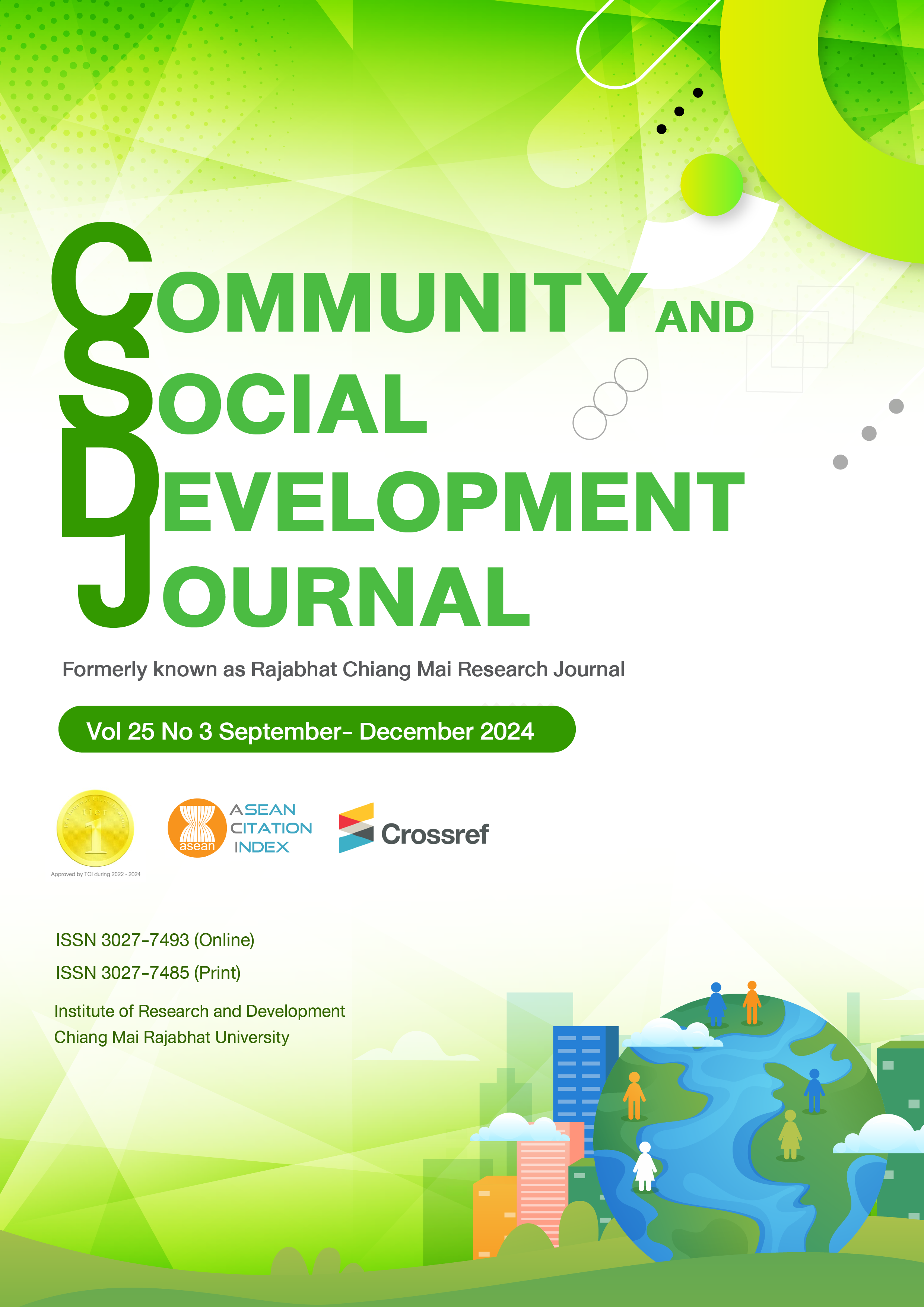Teachers and Gender Issue in English Classrooms: A Case Study of a Secondary Public School in Chiang Rai Province
DOI:
https://doi.org/10.57260/csdj.2024.265984คำสำคัญ:
Gender issue, English classroom, Teacher’s perspective, Secondary public school, English subjectบทคัดย่อ
This research aimed to study gender issue in English classrooms through teachers’ perspective and the classroom activities in a secondary public school in Chiang Rai. The data was collected from classroom observation and interviewing 6 key informants by in – depth and semi – structured interview. The result of the research was presented into 2 main points. First, teachers’ perspectives towards gender issue were related to their personal background including class, age, education, teaching experience, and gender. Those perspectives are 1) patriarchy and conservative 2) gender neutral 3) challenging towards gender issue. Second, the reproduction of patriarchy from teachers’ attitude or the reconstruction of gender issue could be occurred in classrooms. The context and phenomenon including the growth of freedom, rights, equality, and equity have been affecting and challenging the English classrooms in term of gender issue.
Downloads
เอกสารอ้างอิง
Apple, M. W. (1993). The politics of official knowledge: Does a national curriculum make sense?. Teachers college record, 95(2), 222-241. Retrieve from https://doi.org/10.1177/016146819309500206
Bergvall, V. L., & Remlinger, K. A. (1996). Reproduction, Resistance and Gender in Educational Discourse: The Role of Critical Discourse Analysis. Discourse & Society, 7(4), 453–479. Retrieve from https://doi.org/10.1177/0957926596007004002
Billingto -Grieg, T. (1911). Emancipation in a Hurry. I. NA, 8, 246247.
Borg, S. (2006). The distinctive characteristics of foreign language teachers. Language teaching research, 10(1), 3-31. Retrieve from https://doi.org/10.1191/1362168806lr182oa
Boriboon, P. (2011). English Language Teaching in Thailand: A Paradigm Shift from English as a Foreign Language to English as an International Language. Creative Science, 3(6), 1-12. Retrieve from https://ph01.tci-thaijo.org/index.php/snru_journal/article/view/9981
Christie, P., & Lingard, B. (2020). Teachers and schooling making a difference: Productive pedagogies, assessment and performance. Routledge.
Department of Women’s Affairs and Family Development. (2007). Victims of Domestic Violence Protection Act B.E. 2005. Retrieve from https://www.dwf.go.th/contents/10686
Dinnerstein, D. (1989). What does feminism mean. Rocking the ship of state: Toward a feminist peace politics.
Freire, P. (1998). Cultural action and conscientization. Harvard Educational Review, 40(3), 452-477. Retrieve from https://doi.org/10.17763/haer.40.3.h76250x720j43175
Joseph, G. I., & Lewis, J. (1986). Common differences: Conflicts in black and white feminist perspectives. South End Press.
Kennedy, H. (1997). Learning Works: widening participation in further education. Retrieve from https://www.education-uk.org/documents/kennedy1997/index.html
Krischaroen, S. (2004). Being female/male and sex dimension: Reproductive health of woman. Chanmuang Publishing, Songkhla.
Larzén‐Östermark, E. (2008). The intercultural dimension in EFL‐teaching: A study of conceptions among Finland‐Swedish comprehensive school teachers. Scandinavian Journal of Educational Research, 52(5), 527-547. Retrieve from https://doi.org/10.1080/00313830802346405
Liddicoat, A. J. (2002). Some future challenges for languages in Australia. Babel, 37(2), 29-31. Retrieve from https://eric.ed.gov/?id=EJ659464
Maher, F. A., & Ward, J. V. (2001). Gender and teaching. Routledge.
Nawarat, N. (2016). School System Education: Women’s Creation of Self and Otherness. Retrieve from http://www.multied.org/wp-content/uploads/2016/02/
Nawarat, N. (2018). Women’s education : Self and knowledge space. Chiang Mai: Faculty of Education, Chiang Mai University.
Newton, J., Yates, E., Shearn, S., & Nowitzki, W. (2010). Intercultural communicative language teaching: Implications for effective teaching and learning. Report to the Ministry of Education Ministry of Education, New Zealand.
Santasombat, Y. (2005). Human and culture. (3rd ed.). Bangkok: Thammasart University Publication.
Shrewsbury, C. M. (1993). What is feminist pedagogy?. Women's Studies Quarterly, 21(3/4), 8-16.
Sivarom, S. (2008). Social science of education. Bangkok: Sangsarn Publishing.
Sivarom, S. (2008). Social science of education. Chiang Mai: Sangsan.
Stromquist, N. P. (2003). Inequality as a way of life: Education and social class in Latin America. Pedagogy, culture and society, 12(1), 95-119. Retrieve from https://doi.org/10.1080/14681360400200191
Sukwisith, W. (2013). Gender-Discourse: Ideology on Gender Represented by Linguistic Strategies in Public Discourse of Thai Language. Vacana, 1(1), 23-45. Retrieve from http://rs.mfu.ac.th/ojs/index.php/vacana/article/view/132
Thaweesit, S. (2004). Gender: The body challenge identity search. Chaing Mai: Women’s Studies Center, Faculty of Social Sciences, Chaing Mai University.
Webb, L. M., Allen, M. W., & Walker, K. L. (2002). Feminist pedagogy: Identifying basic principles. Academic Exchange, 6(1), 67-72. Retrieve from https://www.researchgate.net/publication/225274654_Feminist_pedagogy_Identifying_basic_principles
Wood, D., & Wood, H. (1991). Signed English in the classroom, I. Teaching style and child participation. First language, 11(32), 189-217. Retrieve from https://doi.org/10.1177/014272379101103201
Xuto, N. (1995). Evaluation of textbook and handout in gender role teaching: A research report. National commission on woman’s affairs, Office of the prime minister.Bangkok.
ดาวน์โหลด
เผยแพร่แล้ว
รูปแบบการอ้างอิง
ฉบับ
ประเภทบทความ
สัญญาอนุญาต
ลิขสิทธิ์ (c) 2024 Community and Social Development Journal

อนุญาตภายใต้เงื่อนไข Creative Commons Attribution-NonCommercial-NoDerivatives 4.0 International License.
1. บทความ ข้อมูล เนื้อหา รูปภาพ ฯลฯ ที่ได้รับการตีพิมพ์ใน “Community and Social Development Journal” ถือเป็นลิขสิทธิ์ของ Community and Social Development Journal มหาวิทยาลัยราชภัฏเชียงใหม่ และเพื่อให้เผยแพร่บทความได้อย่างเหมาะสมผ่านสื่อสิ่งพิมพ์และอิเล็กทรอนิกส์ ผู้เขียนยังคงถือครองลิขสิทธิ์บทความที่ตีพิมพ์ภายใต้ใบอนุญาต Creative Commons Attribution (CC BY) ซึ่งอนุญาตให้เผยแพร่บทความซ้ำในแหล่งอื่นได้ โดยอ้างอิงต้องอ้งอิงบทความในวารสาร ผู้เขียนต้องรับผิดชอบในการขออนุญาตผลิตซ้ำเนื้อหาที่มีลิขสิทธิ์จากแหล่งอื่น
2. เนื้อหาบทความที่ปรากฏในวารสารเป็นความรับผิดชอบของผู้เขียนบทความโดยตรง ซึ่งกองบรรณาธิการวารสารไม่จำเป็นต้องเห็นด้วยหรือร่วมรับผิดชอบใดๆ














